Social Welfare
Swasth Nari Sashakt Parivar Abhiyaan
Empowering Women and Families for a Healthier India
Posted On:
16 SEP 2025 4:21PM
Key Takeaways
- The Swasth Nari Sashakt Parivar Abhiyan will deploy more than one lakh health camps across Ayushman Arogya Mandirs and Community Health Centres.
- The Abhiyan intends to ensure comprehensive screenings for women’s health issues like anaemia, hypertension, diabetes, and cancer.
- One of the key objectives of the Abhiyan is to support immunisation efforts and nutritional benefits to reduce maternal and child mortality rates.
- The Abhiyan aims to operate on real-time monitoring via the SASHAKT portal to ensure transparency and efficiency.
- The Swasth Nari Sashakt Parivar Abhiyan has community support system as one of its pivotal components, with Nikshay Mitras being critical to the implementation of the scheme across the country.
Introduction
The Swasth Nari Sashakt Parivar Abhiyaan (SNSPA) is a landmark initiative by the Ministry of Health and Family Welfare (MoHFW) and the Ministry of Women and Child Development (MoWCD), aimed at strengthening healthcare services for women and children across India, with a focus on improving access, quality care, and awareness. Described as a Jan Bhagidaari Abhiyaan, it encourages active participation from private hospitals and healthcare professionals to foster inclusive healthcare delivery.
The campaign will be inaugurated on September 17, 2025 by Prime Minister Narendra Modi, on his 75th birthday, aligning with his vision for empowered communities.
The Abhiyan is organising more than one lakh health camps, making this the largest ever health outreach for women and children in the country. These camps will be organised at Ayushman Arogya Mandirs, Community Health Centres[1], and other healthcare facilities and will actively promote nutrition, health awareness, and overall family well-being.
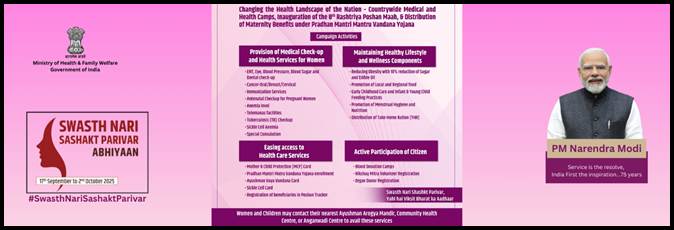
This Abhiyaan supports the government's broader goal of building healthier families and aligns with national priorities for inclusive development, leveraging platforms such as the Anganwadis to amplify outreach and sustainability in maternal and child health programs.
Background
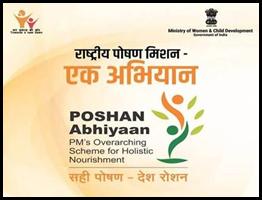
The comprehensiveSwasth Nari Sashakt Parivar Abhiyaan (SNSPA), initiated by Prime Minister Narendra Modi is a pivotal health campaign that will run till Gandhi Jayanti on October 2, 2025.
It builds on the legacy of transformative government programs like Swachh Bharat Abhiyaan, leveraging the momentum of nationwide health and sanitation drives to address critical gaps in maternal and child health, as identified in prior national health surveys.
The Swasth Nari Sashakt Parivar Abhiyaan is strategically alignedwith existing government schemes such as Mission Shakti, which focuses on women’s safety and empowerment, and Poshan 2.0, aimed at combating malnutrition among women and children.
Objectives
Enhance Women’s Health Through Comprehensive Screening and Services
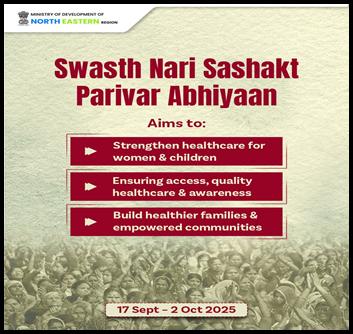
The Swasth Nari Sashakt Parivar Abhiyaan (SNSPA) prioritises women’s health by providing comprehensive health screenings and services tailored to their needs. Through health camps and other related initiatives, the campaign offers screenings for conditions like dermatological concerns, hypertension, anaemia, reproductive health issues, breast and cervical cancer, diabetes, tuberculosis (TB), and sickle cell disease (SCD), with specialised counselling in tribal areas.
These services, supported by the Ministry of Health and Family Welfare, aim to address gaps identified in national health surveys, ensuring early detection and treatment to improve women’s health across urban and rural areas.
The initiative involves specialists like gynaecologists, surgeons, and dentists, supported by district hospitals, to ensure accurate diagnosis and follow-up care, addressing health disparities identified in national surveys.
Promote Family Well-Being via Maternal and Child Care
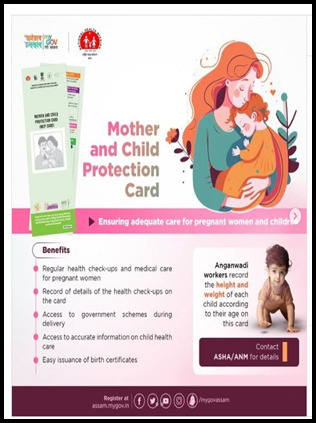
SNSPA focuses on maternal and child care to strengthen family well-being, integrating with initiatives like Poshan 2.0. The campaign strengthens maternal and child health by providing antenatal care (ANC) check-ups, counselling, and distribution of Mother and Child Protection (MCP) cards to monitor health progress.
Immunisation services for pregnant women and children are a key focus, conducted through Anganwadis and health centres in alignment with Poshan 2.0.
With a focus on preventive care and nutrition awareness, SNSPA aims to reduce maternal and child mortality rate. It thus contributes to the larger goal of building resilient families aligned with the Prime Minister’s Viksit Bharat 2047 vision.
Foster Behaviour Changes Through Education
The Abhiyaan drives behavioural change by educating communities on essential health issues such as menstrual hygiene, balanced nutrition, and overall wellness. Through workshops and awareness programs at Anganwadis during Poshan Maah, the Swasth Nari Sashakt Parivar Abhiyaan (SNSPA) empowers women with the knowledge to make informed health choices. Facilitated by healthcare workers and community leaders, this education aims to break taboos, promote hygiene practices, and encourage sustainable health behaviours among women and their families.
Additionally, the campaign promotes Nikshay Mitra enrolment to support overall aim of the mission, fostering community involvement in national health goals and ensuring sustainable health practices.
Encourage Community Participation and Public Awareness
Swasth Nari Sashakt Parivar Abhiyaan (SNSPA) fosters community participation by promoting a Jan Bhagidaari Abhiyaan, encouraging involvement from private hospitals, local leaders, and citizens. Public awareness campaigns, supported by the Ministry of Health and Family Welfare and the Ministry of Women and Child Development, highlight the importance of women’s health and family well-being through targeted media outreach and community-level engagement. By engaging communities, SNSPA ensures sustainable impact to create a healthier, more empowered society.
Implementation Strategy
Nationwide Health Camps with Real-Time Monitoring
- SNSPA will organise more than one lakh health camps across Ayushman Arogya Mandirs and Community Health Centres, coordinated and tracked through the SASHAKT portal for real-time updates on progress and resource allocation.
- This digital platform, managed by the Ministry of Health and Family Welfare, ensures transparency and efficiency, enabling stakeholders to monitor camp activities, attendance, and outcomes, thereby addressing gaps in women’s health and nutrition as identified in national surveys.
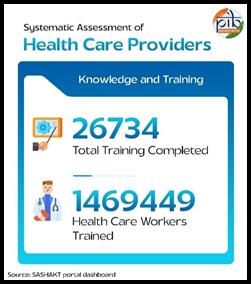
- Beneficiaries will be enrolled under PM-JAY, Ayushman Vaya Vandana, and ABHA. Helpdesks will be set up at health camps for card verification and grievance redressal.
Healthcare Worker Accountability via Self-Verification
- A self-verification system engages healthcare functionaries, including Medical Officers, Community Health Officers (CHOs), Multipurpose Workers (MPWs), and Accredited Social Health Activists (ASHAs), to ensure accountability and adherence to protocols.
- This system, integrated with the SASHAKT portal, allows workers to report their activities, and ensure that services like screenings, immunisations, and counselling are delivered effectively at the grassroots level.
Multi-Platform Outreach for Awareness
- SNSPA aims to leverage Doordarshan, All India Radio (AIR), and social media campaigns to maximise public awareness and participation. These platforms, aligned with Poshan Maah activities at Anganwadis, promote key messages on women’s health, nutrition, and hygiene.
- By utilising national media networks, the campaign ensures that its objectives reach both urban and rural populations, fostering widespread engagement.
Volunteer and Nikshay Mitra Engagement
- The campaign expands participation through Nikshay Mitras and volunteers, who support tuberculosis eradication efforts and community health initiatives.
- Collaborations with voluntary organisations and the Indian Red Cross Society, particularly for blood donation camps, enhance community involvement. This approach, rooted in the Jan Bhagidaari Abhiyaan model, ensures sustainable impact by mobilising local support and resources.
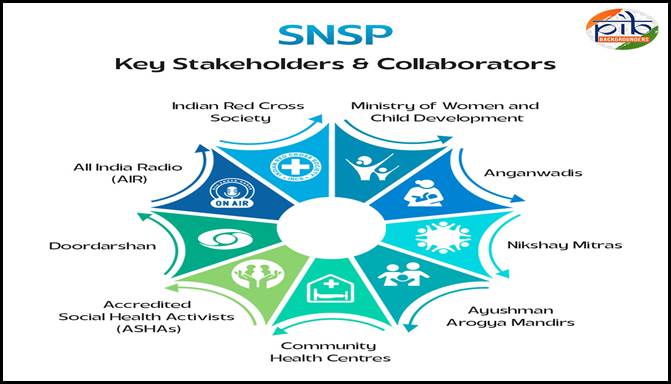
Impact and Expected Outcomes
Enhanced Health Metrics
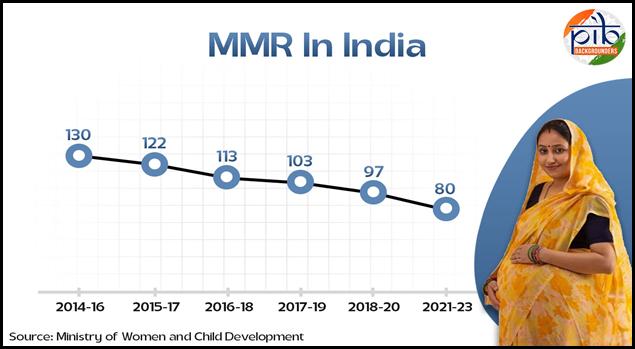
- Swasth Nari Sashakt Parivar Abhiyan (SNSPA) is expected to significantly improve key health indicators, particularly by reducing the maternal mortality rate through comprehensive antenatal care, screenings, and immunisations provided at health camps.
- The campaign’s focus on early detection of conditions like anaemia, hypertension, and diabetes, as highlighted by the Ministry of Health and Family Welfare, aims to address gaps identified in national health surveys, ensuring better health outcomes for women and children across India.
Increased Awareness of Hygiene and Wellness
- The campaign aims to boost awareness of menstrual hygiene, nutrition, and overall wellness among women and families through educational sessions conducted during Poshan Maah at Anganwadis.
- By leveraging platforms like Doordarshan and All India Radio, SNSPA promotes sustainable behavioural changes to foster healthier lifestyles. These efforts, supported by the Ministry of Women and Child Development, empower communities with the knowledge needed for long-term well-being.
Expanded Healthcare Access in Underserved Regions
- Swasth Nari Sashakt Parivar Abhiyan (SNSPA) aims to enhance healthcare access in rural and tribal areas by deploying specialist medical services (e.g., gynaecologists, surgeons) and organising blood donation drives in collaboration with the Indian Red Cross Society.
- Supported by Ayushman Arogya Mandirs and Community Health Centres, the campaign intends to ensure equitable healthcare delivery, particularly for tribal communities through targeted counselling for sickle cell disease (SCD) and tuberculosis (TB). This aligns with the government’s commitment to inclusive health coverage under schemes like Mission Shakti.
Other Relevant Schemes
Janani Shishu Suraksha Karyakram (JSSK)
- The Janani Shishu Suraksha Karyakram (JSSK), expanded in 2014 under the guidance of Prime Minister Narendra Modi, broadened its coverage to provide comprehensive care for all antenatal and postnatal complications.
- The programme ensures that mothers and newborns receive critical healthcare services, particularly within the first 48 hours after delivery, to improve maternal and neonatal outcomes.
- Since its expansion in 2014–15, JSSK has reached over 16.60 crore beneficiaries[2], offering free healthcare services that have significantly reduced out-of-pocket expenses for families. By addressing financial barriers, the initiative has strengthened access to quality maternal and child healthcare across India.
Janani Suraksha Yojana (JSY)
- In alignment with the Janani Shishu Suraksha Karyakram (JSSK), the Janani Suraksha Yojana (JSY) has supported over 11.07 crore beneficiaries as on March 2025[3]. This initiative has significantly advanced maternal and child healthcare by providing financial assistance to ensure access to quality delivery services.
- JSY, a conditional cash transfer scheme, incentivises institutional deliveries among economically disadvantaged pregnant women, with a focus on rural and underserved areas. By addressing financial barriers, the program encourages safer childbirth practices, contributing to improved health outcomes for mothers and newborns.
SurakshitMatritvaAashwasan (SUMAN)
- The Surakshit Matritva Aashwasan (SUMAN) initiative provides zero-cost, high-quality healthcare services for pregnant women, sick newborns, and mothers up to six months post-delivery.
- It ensures dignified and respectful care delivered by trained professionals in certified facilities, strengthening maternal and neonatal health outcomes.

Mission Indradhanush
- Launched on December 25, 2014, Mission Indradhanush is a key public health initiative aimed at enhancing immunisation coverage for children and pregnant women, protecting them from life-threatening diseases.
- Under the Ministry of Health and Family Welfare, the mission strengthens the Universal Immunisation Programme (UIP) by addressing coverage gaps to safeguard vulnerable populations from preventable diseases.
- As on December 2024, more than 5.46 crore children and 1.32 crore pregnant women[4] have been vaccinated.
Pradhan Mantri Surakshit Matritva Abhiyan (PMSMA)
- The Pradhan Mantri Surakshit Matritva Abhiyan (PMSMA) plays a critical role in safeguarding maternal health by offering four comprehensive antenatal check-ups during the first trimester, enabling timely detection of high-risk pregnancies.
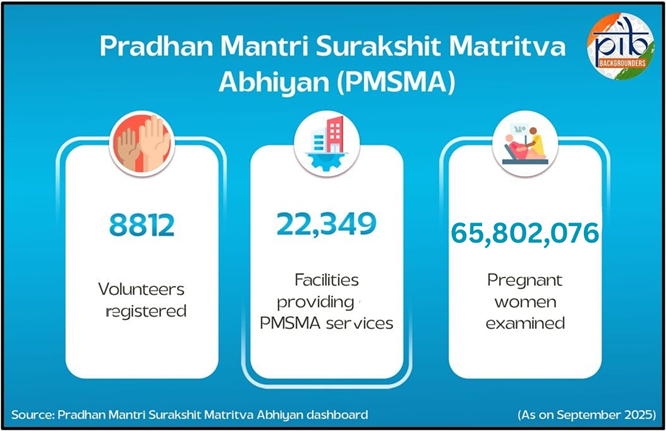
Pradhan Mantri Matru Vandana Yojana (PMMVY)
- Launched in 2017, the Pradhan Mantri Matru Vandana Yojana (PMMVY), led by the Ministry of Women and Child Development, offers maternity benefits of ₹5,000 for the first child (plus Janani Suraksha Yojana incentives, averaging ₹6,000) to support disadvantaged pregnant and lactating mothers.
- For the second child, if a girl, PMMVY provides ₹6,000, aiming to promote girl child welfare, enhance sex ratio at birth, and improve maternal health among socially and economically vulnerable women.
Suposhit Gram Panchayat Abhiyaan
- The campaign identifies and rewards the top 1,000 Gram Panchayats for outstanding grassroots efforts in enhancing nutrition and health outcomes.
- These Suposhit Gram Panchayats serve as exemplary models of community-led progress in maternal and child nutrition.
Conclusion
The Swasth Nari Sashakt Parivar Abhiyaan (SNSPA) represents a pivotal stride in India's journey towards Viksit Bharat 2047, positioning women's health and family empowerment at the heart of national development. By integrating comprehensive screenings, maternal and child care services, behavioural education, and community-driven initiatives, SNSPA not only addresses critical gaps in healthcare access and awareness but also builds on the success of flagship programs like Swachh Bharat Abhiyaan, Mission Shakti, and Poshan 2.0. Through collaborative efforts involving government ministries, private stakeholders, and grassroots volunteers, the campaign fosters sustainable behavioural changes, reduces maternal and child mortality, and promotes equitable health outcomes across urban, rural, and tribal areas. Culminating on Gandhi Jayanti, the Swasth Nari Sashakt Parivar Abhiyaan highlights the government’s commitment to inclusive development progress, empowering women as catalysts for change and laying the foundation for healthier, stronger families that drive India's transformative growth.
References:
Press Information Bureau:
https://www.pib.gov.in/PressReleasePage.aspx?PRID=2154106
https://www.pib.gov.in/PressNoteDetails.aspx?NoteId=154585&ModuleId=3
https://www.pib.gov.in/PressReleasePage.aspx?PRID=2098857
https://www.pib.gov.in/PressReleasePage.aspx?PRID=2085204
Ministry of Health and Family Welfare:
https://www.sashakt-hwc.mohfw.gov.in/home
https://x.com/MoHFW_INDIA/status/1964977895815934026
Ministry of Women and Child Development:
https://www.india.gov.in/women-empowerment-scheme-ministry-women-child-development?page=1
https://pmsma.mohfw.gov.in/
Other:
https://www.newsonair.gov.in/pm-modi-to-launch-swasth-nari-sashakt-parivar-abhiyaan-on-september-17/
Click here to see pdf
****
SK/RK
(Explainer ID: 155215)
आगंतुक पटल : 13869
Provide suggestions / comments